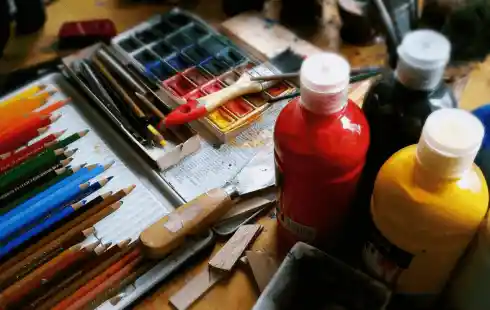
Pantone's Color of the Year an Endless Neutral Loop
Section: Fashion
 In the realm of mental health treatment, traditional methods like medication and talk therapy have long been the mainstays. However, in recent years, alternative approaches such as art therapy have gained recognition for their efficacy in aiding those grappling with depression. This form of therapy harnesses the power of creative expression to delve into the emotional landscape of individuals, offering them a unique pathway towards healing.
In the realm of mental health treatment, traditional methods like medication and talk therapy have long been the mainstays. However, in recent years, alternative approaches such as art therapy have gained recognition for their efficacy in aiding those grappling with depression. This form of therapy harnesses the power of creative expression to delve into the emotional landscape of individuals, offering them a unique pathway towards healing.
Art therapy involves the use of various art forms--such as painting, drawing, sculpting, and collage-making--as tools for self-expression and introspection. Unlike conventional talk therapy, which relies heavily on verbal communication, art therapy provides individuals with alternative means to communicate their thoughts, emotions, and experiences.
Dr. Sarah Richards, a licensed art therapist, explains, "Art therapy taps into the subconscious mind, allowing individuals to explore and process complex emotions that they may struggle to articulate verbally. The creative process itself can be deeply therapeutic, offering a sense of catharsis and empowerment."
Addressing Depression through Creativity
Depression, characterized by persistent feelings of sadness, hopelessness, and a loss of interest in activities, can be particularly challenging to treat. While medication and traditional therapy can be effective for many individuals, some may find it difficult to express themselves verbally or may feel overwhelmed by their emotions.
Art therapy offers an alternative approach that bypasses these barriers. By engaging in creative activities, individuals can externalize their inner turmoil, gain insight into their emotions, and develop coping mechanisms to manage their symptoms.
"Art therapy provides a safe and non-judgmental space for individuals to explore their feelings," says Dr. Richards. "Through the act of creating art, clients can gain a deeper understanding of their depression and develop strategies to cope with it effectively."
Scientific Evidence Supporting Art Therapy
Research into the efficacy of art therapy for depression has yielded promising results. Numerous studies have demonstrated its effectiveness in reducing symptoms of depression, improving mood, and enhancing overall well-being.
A meta-analysis published in the Journal of the American Art Therapy Association examined 27 studies on the use of art therapy for depression. The analysis found that art therapy was associated with significant reductions in depressive symptoms across various populations, including adults, adolescents, and older adults.
Furthermore, neuroscientific studies have shown that engaging in artistic activities can stimulate the release of endorphins, neurotransmitters responsible for feelings of pleasure and happiness. This neurological response can help alleviate symptoms of depression and promote a sense of emotional well-being.
Personal Stories of Transformation
For many individuals struggling with depression, art therapy has been a lifeline, offering them a pathway towards healing and self-discovery. Emily, a 32-year-old graphic designer, shares her experience with art therapy:
"Depression had consumed me for years, and I felt like I was drowning in a sea of darkness. Traditional therapy helped to some extent, but it wasn't until I discovered art therapy that I truly began to heal. Through painting and collage-making, I was able to externalize my pain and confront it head-on. Art became my voice when words failed me, and it helped me navigate through the darkest chapters of my life."
Similarly, John, a retired teacher who struggled with depression following the loss of his spouse, found solace in art therapy:
"After my wife passed away, I felt like I had lost a part of myself. I was overwhelmed by grief and couldn't see a way forward. Art therapy provided me with a creative outlet to express my emotions and process my loss. Through sculpting and pottery, I found moments of peace and healing. Art became a beacon of hope in my darkest days."
The Future of Art Therapy
As awareness of the benefits of art therapy continues to grow, mental health professionals are increasingly incorporating it into their treatment approaches. From hospitals and clinics to community centers and schools, art therapy programs are proliferating, offering individuals of all ages and backgrounds a means to cope with depression and other mental health challenges.
While art therapy may not be a panacea for depression, it serves as a valuable complement to existing treatment modalities. By harnessing the power of creativity, individuals can embark on a journey of self-exploration, resilience, and healing--one brushstroke at a time.
Image by Bodo Bertuleit from Pixabay

Section: Fashion

Section: News

Section: Business

Section: Fashion

Section: Business

Section: Arts

Section: Politics

Section: Health Insurance

Section: News

Section: News
Both private Health Insurance in Germany and public insurance, is often complicated to navigate, not to mention expensive. As an expat, you are required to navigate this landscape within weeks of arriving, so check our FAQ on PKV. For our guide on resources and access to agents who can give you a competitive quote, try our PKV Cost comparison tool.
Germany is famous for its medical expertise and extensive number of hospitals and clinics. See this comprehensive directory of hospitals and clinics across the country, complete with links to their websites, addresses, contact info, and specializations/services.
Join us for an enchanting Christmas adventure at the Münchner Marionettentheater! Experience the marionette play 'Der verschwundene Wunschzettel' by Siegfried Böhmke, featuring our beloved Kasperl Larifari and his little friend Stupsi. As Christmas approaches, both Kasperl and Stupsi have prepared...



No comments yet. Be the first to comment!